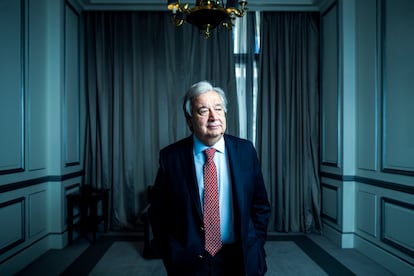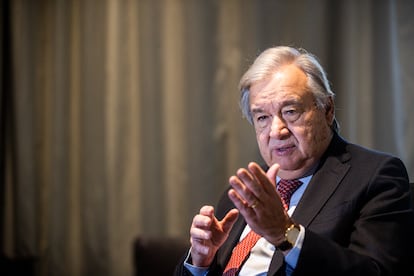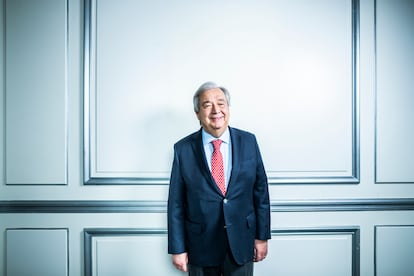António Guterres: ‘Peace negotiations are not possible at this time. Both Russia and Ukraine believe they can win’
The U.N. secretary general talks to EL PAÍS about the Russian invasion, Europe’s failure to address the refugee crisis and why more needs to be done to address global warming

United Nations Secretary General António Guterres was awarded the Charles V European Award on Tuesday at the Yuste Monastery in Cáceres, Spain. Upon receiving the award from Spain’s King Felipe VI, Guterres said the recognition held “special meaning” for him.
“When I won the first election [in Portugal, 1995] I went with my wife to Yuste, and I was impressed to see that someone who had been emperor of the world spent the last years of his life, after abdicating, in a very simple monastery, which is a lesson for many politicians today,” said Guterres. When he speaks — in a soft and slow Spanish peppered with Portuguese terms — Guterres seems to yearn for a retirement like that of Holy Roman Emperor Charles V, far from today’s troubled world, where he must address the war in Ukraine, global warming and the refugee crisis. He spoke about these problems in an interview with EL PAÍS on Monday.
Question. You have received an award that recognizes European spirit at a time when the continent is once again witnessing a war on its territory. How can Europe and the U.N. stop the war in Ukraine?
Answer. Unfortunately, I believe that peace negotiations are not possible at this time. Both parties are convinced that they can win. This was a Russian invasion against international law, against the United Nations Charter, but I do not think Russia is willing at the moment to withdraw from the territories it occupies, and I think Ukraine is hoping to retake them. What we are doing, as much as possible, is to dialogue with both parties to solve specific problems. The most important initiative has been the export of grain from Ukraine and food products and fertilizers from Russia through the Black Sea.
Q. That agreement expires on May 18. Are you confident it will be renewed?
A. The last thing I did last night [Sunday] and the first thing I did this morning [Monday] was to get in touch with my colleagues who are dealing with the matter. We are completely engaged in trying to save the initiative. Rebeca Grynspan [Secretary General of the United Nations Conference on Trade and Development] was in Moscow and Martin Griffiths [Under-Secretary-General for Humanitarian Affairs] is in Istanbul [on Tuesday]. We are preparing a meeting of the four parties [Russia, Ukraine, the United Nations and Turkey] in Istanbul, and we are doing everything possible to better respond to the Russian problems. It is true that the export of food and fertilizers is not under sanction, but there are indirect obstacles that remain, and we are trying to eliminate them; in addition to solving the issues that exist with inspections, which are on hold in the Black Sea. It is a question of achieving an extension of the initiative that is more lasting and perfect.
Q. Will peace have to wait until both sides are convinced that neither side can win?
A. At this moment I don’t see any possibility of immediately achieving — we are not talking about the future — a global ceasefire, a peace negotiation.
Q. Meanwhile, there is a risk of escalation: the use of tactical atomic weapons by Russia or a nuclear accident in Zaporizhzhia.
A. Zaporizhzhia is a big concern. I hope there is enough care on both sides to prevent a tragedy. And I think the possibility of a nuclear escalation is very small. The Chinese initiative was very important for stating very clearly that a nuclear escalation is unacceptable. The fact that China has taken that position is very important in avoiding a temptation that would be an intolerable absurdity.
Q. Are the mediation offers from China or from Brazilian President Lula da Silva doomed to failure?
A. I already said that a peace negotiation is not going to happen at this time. I hope it will in the future. There was talk of a Russian offensive in the winter and a Ukrainian one in the spring. It is clear that both parties are fully engaged in the war.
Q. Does the delivery of weapons to Ukraine respond to the right to self-defense?
A. I have never made nor will I make any comment on the support that exists or does not exist. It is clear that both parties have tried to acquire weapons, and that is what happens in wars. The objective is to achieve — not immediately but later — a peace that is just, in accordance with international law and the United Nations Charter. But we are still a long way from that.
Q. You have warned that we are on our way to seeing a 2.8º Celsius (5ºF) rise in global temperatures by the end of the century. Does this mean the Paris Agreement — which set the goal of keeping the rise below 1.5ºC — will have to be abandoned?
A. The recent report from the IPCC [Intergovernmental Panel on Climate Change], the highest scientific authority on the matter, states that it is possible that temperatures will not rise above 1.5ºC by the end of the century, but [for that to happen] we have to dramatically change what we are doing, because emissions are continuing to rise. I have proposed a solidarity pact between the large developed economies and the large emerging ones, which represent 80% of emissions. My proposal is that the former manage to reach carbon neutrality as close as possible to 2040 and the latter, as close as possible to 2050. But we are not heading in that direction. We have not yet found the political will from governments, and the contributions of the private sector are not enough to avoid a catastrophe with unforeseeable consequences.

Q. Do we still have time to prevent this from happening?
A. We are very close to the moment of truth. If the necessary measures are not taken, the 1.5ºC target will be lost forever, and that would be terrible for humanity.
Q. Should the oil companies be held accountable?
A. Oil companies should be at the forefront of decarbonization. Today we are witnessing something that is morally intolerable. We are seeing these companies make exceptional profits that they are using to buy their own shares instead of investing in green energy, which has led us to ask states to implement extraordinary taxes. The current situation is an insult, especially for the most vulnerable populations, who are paying a very, very high price so that these companies can have a very, very high profit.
Q. Since you were U.N. High Commissioner for Refugees between 2005-2015, the situation and numbers of displaced persons has only worsened.
A. Back then, international refugee law was respected practically everywhere in the world. Unfortunately, we see that today in the Great South there is willingness to accommodate hundreds of thousands of refugees, as in Sudan, but in the developed world many doors have been closed. There is no policy to guarantee that migration is ordered and regulated, which is why traffickers control it, with terrible violations of human rights. I think that Europe has a problem to solve: its demography is unsustainable and immigration is a component to guarantee its survival. But there is no European migration policy. There are national policies — which are sometimes contradictory — and this means that Europe does not have a positive role in the global regulation of population movements. It’s a shame.
Q. Europe has welcomed millions of Ukrainians, but has closed the door to other groups.
A. There was a great openness towards the refugees from Ukraine and that is very good, but the same countries had a completely closed attitude towards Syrian refugees, and we witnessed the terrible image of seeing them march through the Balkans in a chaotic situation. And that has a very negative impact on the south. Many wonder why there is not very strong support for Ukraine in those countries, and the truth is that they feel that there are two standards and measures, among other matters, in immigration, and that causes deep frustration.

Sign up for our weekly newsletter to get more English-language news coverage from EL PAÍS USA Edition
Tu suscripción se está usando en otro dispositivo
¿Quieres añadir otro usuario a tu suscripción?
Si continúas leyendo en este dispositivo, no se podrá leer en el otro.
FlechaTu suscripción se está usando en otro dispositivo y solo puedes acceder a EL PAÍS desde un dispositivo a la vez.
Si quieres compartir tu cuenta, cambia tu suscripción a la modalidad Premium, así podrás añadir otro usuario. Cada uno accederá con su propia cuenta de email, lo que os permitirá personalizar vuestra experiencia en EL PAÍS.
¿Tienes una suscripción de empresa? Accede aquí para contratar más cuentas.
En el caso de no saber quién está usando tu cuenta, te recomendamos cambiar tu contraseña aquí.
Si decides continuar compartiendo tu cuenta, este mensaje se mostrará en tu dispositivo y en el de la otra persona que está usando tu cuenta de forma indefinida, afectando a tu experiencia de lectura. Puedes consultar aquí los términos y condiciones de la suscripción digital.








































